|
|
|
Sort Order |
|
|
|
Items / Page
|
|
|
|
|
|
|
| Srl | Item |
| 1 |
ID:
133804
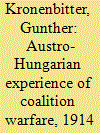

|
|
|
|
|
| Publication |
2014.
|
| Summary/Abstract |
Austria-Hungary's experience of Germany's junior partner was fraught with misunderstandings and a failure to devise a coherent common strategy
While the Anglo-French experience of coalition warfare during the First World War has been the subject of many English-language volumes, Austria-Hungary's relationship with Germany - its senior partner within the Triple Alliance - has been underexplored. In this article, Günther Kronenbitter analyses the uneasy dynamics of this alliance, tracing it through the two countries' wilfully blinkered, thirty-year preparations for a war that eventually came in August 1914, before exploring their increasingly fraught and inadequate efforts to co-ordinate their campaigns and resources - a process marked by resentment and, more importantly, a failure to take a unified strategic approach.
|
|
|
|
|
|
|
|
|
|
|
|
|
|
|
|
| 2 |
ID:
133799
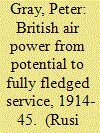

|
|
|
|
|
| Publication |
2014.
|
| Summary/Abstract |
The First World War set British air power on a path of development that by 1939 made an essential contribution to the conduct of war
At the start of the First World War, the potential of air power for military purposes had already been identified but remained largely underdeveloped, with Britain lagging behind some of its direct European competitors. Peter Gray traces how the First World War acted as a catalyst for British forces to use air power in attack and reconnaissance roles, and unleashed the potential for its further development during the interwar years. By the Second World War, air power had become an indispensable element of warfare.
|
|
|
|
|
|
|
|
|
|
|
|
|
|
|
|
| 3 |
ID:
133798
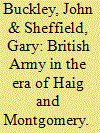

|
|
|
|
|
| Publication |
2014.
|
| Summary/Abstract |
Negative myths about the British Army's performance, especially during the Great War, obscure the reality of an institution that learned and improvide throughout both world wars
The performance of the British Army in the two world wars has been the subject of much scrutiny in both scholarly and popular history. The latter has long been dominated by the perception of an underperforming army fighting under incompetent leadership in a futile First World War, in contrast to a more successful and effective force supporting a just cause in the Second. Yet, John Buckley and Gary Sheffield argue, sound scholarly research paints a much more nuanced picture of an institution that between 1914 and 1945 underwent a rich learning process that must be understood in its entirety.
|
|
|
|
|
|
|
|
|
|
|
|
|
|
|
|
| 4 |
ID:
133800
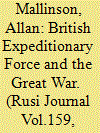

|
|
|
|
|
| Publication |
2014.
|
| Summary/Abstract |
A counterfactual account of what Britain's leaders could have done prior to the Great War to prepare the country more effectively for fighting a European land war
The decision-making of Britain's political and military leaders in August 1914 has been subject to much scrutiny in the intervening century. Allan Mallinson argues vehemently that the wrong decisions were taken in the years preceding the outbreak of the conflict, and presents a counterfactual of what Britain's experience could have been had conscription been introduced or sounder preparations for a land engagement been made before 1914.
|
|
|
|
|
|
|
|
|
|
|
|
|
|
|
|
| 5 |
ID:
133802
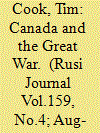

|
|
|
|
|
| Publication |
2014.
|
| Summary/Abstract |
Britain's war effort was crucially aided by its Dominions, with Canada's experience of the First World War a prime example of this fundamental military contribution
Canada's contribution to the war effort on the Western Front was of fundamental importance throughout the Great War. Tim Cook traces how, over four years, what started as a little-organised contingent of 31,000 troops of mostly citizen-soldiers grew into an effective fighting force that made significant contributions to the final victory over the Central Powers.
|
|
|
|
|
|
|
|
|
|
|
|
|
|
|
|
| 6 |
ID:
133797
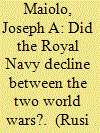

|
|
|
|
|
| Publication |
2014.
|
| Summary/Abstract |
The early setbacks suffered by the Royal Navy during the Second World War have long coloured historians' assessments of the navy's standing during the interwar years, with a consensus settling around a narrative of decline. Yet Joseph A Maiolo argues that, following the strategic victory of the First World War, the Admiralty manoeuvred with great agility to respond to, and curtail, the rise of other naval powers such as the US, Japan and Germany without setting in motion another naval arms race. The result was that by 1939, the Royal Navy was well positioned to play its part in the second global conflict of the twentieth century
|
|
|
|
|
|
|
|
|
|
|
|
|
|
|
|
| 7 |
ID:
133803
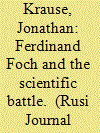

|
|
|
|
|
| Publication |
2014.
|
| Summary/Abstract |
Ferdinand Foch's thinking on trench warfare adapted as the war wore on, making an influential if under-researched contribution to tactical and operational doctrine
Ferdinand Foch, Supreme Allied Commander of the armies that defeated the Central Powers, made a significant contribution to the development of the doctrine of trench warfare throughout the First World War. Yet his name is barely remembered in British popular discourses about the conflict. Jonathan Krause analyses how Foch\'s tactical and operational thinking developed in the crucial period of 1915-16.\r\n
|
|
|
|
|
|
|
|
|
|
|
|
|
|
|
|
| 8 |
ID:
133805


|
|
|
|
|
| Publication |
2014.
|
| Summary/Abstract |
An examination of how the First World War disrupted civilian life, the forms of violence perpetrated against civilians during the conflict, and the role of conscription in creating new hierarchies that privileged ideals of male 'warrior'
The First World War radically changed the relationship between war and civilians, in terms of altered expectations of conflict, the dismantling of the pre-war distinction between combatant and civilian, and the glorification of the soldier as the ideal citizen. Heather Jones asks why the war has been remembered as a 'soldiers' war', exploring how the war disrupted civilian life, the forms of violence perpetrated against civilians during the conflict, and the role of conscription in creating new hierarchies that privileged ideals of male 'warrior', rather than civilian, citizenship.
|
|
|
|
|
|
|
|
|
|
|
|
|
|
|
|
| 9 |
ID:
133796
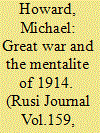

|
|
|
|
|
| Publication |
2014.
|
| Summary/Abstract |
One of the first members to perish was killed barely a few weeks into the war during the retreat following the Battle of Mons on 23 August 1914. Hon Archer Windsor-Clive, a professional cricketer and lieutenant in the Coldstream Guards, was only twenty-three years old when he died in the successful British defence of the village of Landrecies, in the face of a surprise German attack on 25 August. He was one of a great number of casualities suffered by the British Expeditionary Force (BEF) on this day; indeed, 133 members of his battalion were killed, wounded or missing in action after the encounter. Windsor-Clive, the third son of the First Earl of Plymouth, represents the generation of men, regardless of wealth and background, who died at a tragically young age defending their country. In the normal course of events, these young officers - members of RUSI - would have been destined to become the nation's military and political leaders. Windsor- Clive is buried at the Landrecies Communal Cemetery in France.
|
|
|
|
|
|
|
|
|
|
|
|
|
|
|
|
| 10 |
ID:
133808


|
|
|
|
|
| Publication |
2014.
|
| Summary/Abstract |
Popular memory may be shaped by poetry, but it is in prose that some of the most compelling and innovative literary work about the First World War is to be found
For decades, Britain's cultural memory of the First World War has been dominated by poetry, the principal literary interpretation of the war taught in schools throughout the country. This poetry, argues Max Saunders, is often autobiographic and complements the memoirs that many writers penned in trying to express their experiences of the conflict - showing a complex and fluid relationship between autobiography and narrative. What is largely marginalised in British cultural memory is the novel; yet it is perhaps in this literary form, and in the work of Ford Madox Ford above all, that the most innovative interpretations of the conflict can be found
|
|
|
|
|
|
|
|
|
|
|
|
|
|
|
|
| 11 |
ID:
133807


|
|
|
|
|
| Publication |
2014.
|
| Summary/Abstract |
Britain's popular understanding of the Great War has been shaped by a restrictive selection of poetry written during and about the conflict
First World War poetry has become one of the defining factors of Britain's memory of the four-year conflict, providing an accessible path towards understanding the emotions and difficulties encountered during this time. Paul O'Prey examines and disputes some of the myths and misconceptions associated with the popular understanding of the vast body of work that arose during and about the Great War.
|
|
|
|
|
|
|
|
|
|
|
|
|
|
|
|
| 12 |
ID:
133806
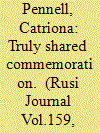

|
|
|
|
|
| Publication |
2014.
|
| Summary/Abstract |
The memory of the war in the British Isles - and Ireland in particular - has been inevitably coloured by political agendas, and the Irish contribution has largely been forgotten. During the First World War, around 35,000 Irishmen - hailing from both the north and south of the island - gave their lives fighting for the British Empire, of which Ireland was then a part. Many tens of thousands more served in Britain's armed forces in theatres around the globe, and especially on the Western Front. Yet this contribution has only recently been recognised by the general pubilc in Ireland; and is largely overlooked by those in Britain. Catriona Pennell explores how tempestuous relationships and political division throughout the twentieth century have coloured the memory of the war within the British Isles.
|
|
|
|
|
|
|
|
|
|
|
|
|
|
|
|
| 13 |
ID:
133801


|
|
|
|
|
| Publication |
2014.
|
| Summary/Abstract |
The First World War was a catalyst for the growth and consolidation of Britain's embryonic intelligence services
War has always had a transformative effect on the development of intelligence, both civil and military. Gill Bennett looks at some of the ways in which armed conflict has affected the development of British intelligence, focusing on the lessons learned during the First World War.
|
|
|
|
|
|
|
|
|
|
|
|
|
|
|
|
|
|
|
|
|